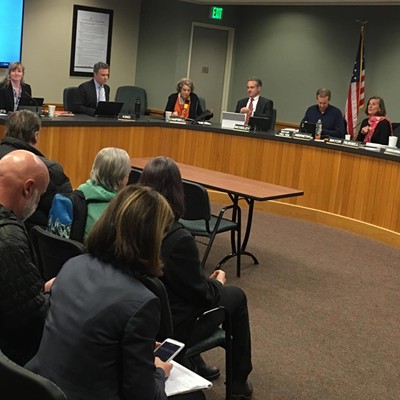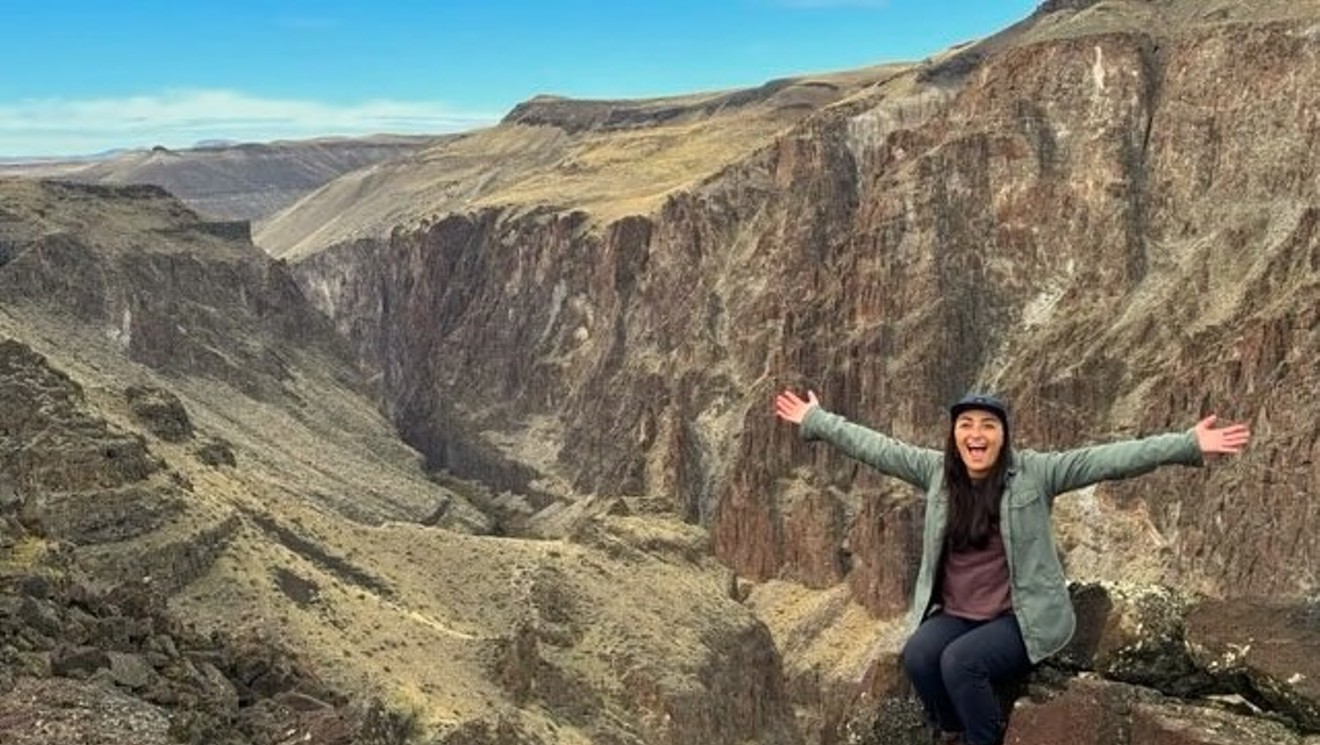You've probably seen them: people wandering up Bond Street, nearly running into other people, smartphone in one hand, scoop of Bonta in the other, trying to find the Deschutes pub. They're called tourists—and like it or not, they're an important part of Bend's economy.
Tourism is Central Oregon's second-largest economic provider, accounting for 15 percent of the economy, according to data provided by Economic Development for Central Oregon. According to data from Bend's finance department, Transient Room Taxes—the taxes collected from hotel rooms or short-term rentals—accounted for over $9 million in revenue for the City of Bend in the last fiscal year, which ended in June. The 2018-2019 proposed budget is for $49,726,547—the largest sum collected through property taxes. TRT income of $9 million represents about 18 percent of the City's budget.
TRT funds are also the economic foundation of tourism promotion in Oregon. In 2003, the Oregon Legislature passed HB 2267, mandating 70 percent of new or increased local lodging taxes be directed to tourism promotion or tourism-related facilities. At the time, the city made the commitment to fund tourism promotion with 30 percent of the initial 9 percent tax rate in Bend. Then in 2013, voters approved measure 9-94, which increased the room tax rate to 10.4 percent.
Last year, the City implemented ordinance NS-2291 that essentially diverted more of the TRT revenue to the general fund. The ordinance pushed the Oregon Restaurant & Lodging Association to file a lawsuit in September of 2017. In the suit, the Association claims the ordinance violates state law because the new code amendment provides 31.2 percent of total room tax revenues for tourism promotion and the remaining 68.8 percent of the revenue can be used for non-tourism promotion. According to the suit, that violated state law in part because of the city's 10.4 percent room tax, 30 percent of the 9 percent room tax rate is required by state law to be spent on tourism promotion and tourism-related facilities. The remaining 1.4 percent is subject to a state-law requiring 70 percent investment in tourism promotion and tourism-related facilities. The city challenged the suit, which is now in the hands of the appellate court.
TRT revenue not only funds tourism promotion, but also public safety and the City's general fund, footing the bill for things including road improvement projects, fire and emergency medical services, municipal court, infrastructure and the city's community and economic development divisions.
Since fiscal year 2009-2010, the amount of TRT revenue has increased yearly and monthly—until this July, when the revenue decreased from $1.4 million in July 2017 to $1.37 million, or about 3.3 percent less. August numbers aren't in yet, but according to Kevney Dugan, CEO and president of Visit Bend—the agency tasked by the city for tourism promotion— August's figures are also likely to be less than a year ago.
Why the downturn?
This year, during Bend's typically busy summer season, hotel occupancy rates were down, according to a report by STR, a global analytics firm. In July, the occupancy rates were 83.4 percent, a drop of 5.4 percent from last July. In 2015-2016, July's occupancy rate was over 90 percent.
For locals who were driving around Bend this summer or trying to get a fishing spot on the Deschutes, it may not have felt like there were fewer tourists than last year—so why the downturn in collected money?
"I think tourism and the jobs created by it are important to Bend. Most towns would be envious of our so-called 'tourism' problems." —Michael Hughes
tweet this
Part of it could be attributed to Visit Bend no longer spending money on tourism promotion for the summer months, instead prioritizing the so-called shoulder seasons—October to November, and April through May—according to Dugan.When Visit Bend does spend money on tourism promotion, it does so on TV, radio and social media to support events like the Bend Film Festival that drives out of town tourism. Dugan said they also do a lot of public relations work with media to help tell Bend's story.
Carolyn Eagan, economic development director for the City of Bend, said, "We are maturing as a tourist destination. This is indicated by the 'leveling off,' in other words, smaller increases or small decreases in year over year revenue, indicate a more mature tourism market."
Eagan said there's not enough data to indicate a downturn. "I would want to see three Julys along with three Octobers and three Februarys in a row with year over year decreases to conclude there's a downturn. I would not include August 2017 in any analysis of trend, as that month was a lifetime anomaly due to the eclipse."
Dugan agrees that August 2017's numbers were likely due to the eclipse, but lodging occupancy rates from Visit Bend show the rate wasn't unusually high—86.2 percent, which was less than the 87.1 percent in 2014-2015. Instead, Dugan said it was the amount charged for rooms that created the spike in TRT. "I am comparing the success of this August versus August 2016 when we don't have a major event like the eclipse skewing the numbers. I hope to have the August (2018) numbers soon and will share those so you can see the changes with the Transient Room Tax largely being up in August 2017 due to a much higher room rate being charged around the time of the eclipse."
Slowing Tourism Promotion?
Many of the candidates for Bend's elected mayor and City Council seats have called for a reduction in the amount allocated for tourism promotion.
Bill Moseley, a current Bend city councilor and mayoral candidate, said on his website,"Most new residents visit Bend as a tourist and then decide to move here. Currently, about nine new people move to Bend each day. The $2.9 million the city spends each year on tourism advertising just adds gasoline to the fire."He went on to say that he was the only councilor that voted against giving Visit Bend's plan to allocate $3 million for tourism promotion funding.
"By law, the remaining revenue must be spent on tourism promotion or tourism-related facilities. We need to think creatively about how we can use tourism dollars on 'tourism-related facilities' that would mitigate some of the impacts of tourism while also benefiting locals." —Gena Goodman-Campbell
tweet this
Joshua Langlais, a local photographer who's also running for mayor, said it's very important to remember that tourism is largely, if not solely, responsible for Bend's recovery after the closing of the mills. But, he said it's safe to say the word's out about Bend, and he didn't think it makes sense to continue to promote at the same pace."Actually, I would say it is unwise to do so and a poor use of resources as modern technology and social media have made it quite easy for anyone who wishes to promote the town,"Langlais said.
Gena Goodman-Campbell, who's running for Bend City Council said, our leaders need to do more to address the negative impacts of tourism, such as traffic, crime, overcrowding on public lands and degrading our natural resources."I'd like to see some of the money that's currently being spent on promotion put towards creative projects that will mitigate the impacts of tourism,"Goodman-Campbell said. She said she recognizes that the city is currently putting the maximum percentage of TRT revenue allowed by the state into the general fund, but would like to see the other funds used differently.
"By law, the remaining revenue must be spent on tourism promotion or tourism-related facilities. We need to think creatively about how we can use tourism dollars on 'tourism-related facilities' that would mitigate some of the impacts of tourism while also benefiting locals."
Brian Douglass, another mayoral candidate, said he believes that we can afford to begin to ratchet down the amount of money being spent on advertising and promotion, especially for the summer season. "The reduction of spending then should be funneled back into the City's General Fund," Douglass said. "Enough is enough!"
Charles Baer, who's also put his hat in the ring for mayor, was more succinct about where he stands on tourism promotion.
"I am for less spending on tourism as a potential mayor," Baer said in an email. "The tourist dollars will be there no matter what we do, hence, we should do less on tourism spending."
Colorado's tourism spending: A case for promotion
Evidence from other states suggests that spending less on tourism promotion may backfire.
In 1993, according to a report by Longwoods International, the state of Colorado became the only state to eliminate its tourism funding when it cut its $12 million promotion budget to zero. The fallout was like a nuclear winter: Colorado's percentage of tourism dollars spent country-wide plunged 30 percent within two years. The state saw a loss of over $1.4 billion in tourism revenue annually. Over time, the loss of revenue increased to well over $2 billion yearly—and, in the important summer season, Colorado's visitation rates dropped from first place among states to 17th.
It took state government leaders seven years to realize the mistake. In 2000, the tourism industry convinced the state legislature to reinstate funding—and the Colorado Tourism Office received a modest $5 million budget. According to the Longwoods report, research tracked the effectiveness of the tourism campaign over the following few years and found it demonstrated a return on investment of over $12 to $1.
Then in 2006, Colorado Gov. Bill Owens signed a bill upping the tourism promotion budget to $19 million, according to the Longwoods report. The following year, Colorado rebounded to an all-time high with 28 million visitors spending $9.8 billion on trips throughout the state.
The rebound, however, was not without side effects. An October 2017 story from 5280: Denver's Mile High Magazine, asked the question: "Are we loving Colorado's wild places to death?" It noted that with the increase of visitors came an increase in trash, feces on trails—dog and human—and damage from illegal fire rings and campsites, among other issues that added pressure puts on the outdoors. That all might sound rather familiar.
Around Central Oregon, the U.S. Forest Service is currently considering going to a permit system to address the issues of overuse in the Deschutes and other national forests. In 2016, Bend resident and writer Katy Bryce penned a blog that went viral locally—titled, "Bend Is Being Loved to Death — And It's My Fault." Bryce wrote about seeing piles of plastic floating down the Deschutes River, and included photos of garbage lining the area near the Whitewater Park.
Leaders at Visit Bend say they're actively trying to get visitors to act responsibly. On its webpage, there's the Bend Pledge, which has a list of things people can do to ensure Bend stays special for years to come. They also have the Visit Like a Local campaign which reminds tourists Bend residents live by the "Leave No Trace" code.
What replaces tourism?
Although many of the candidates looking to fill City Hall are for pumping the brakes on tourism promotion spending, few are for an outright moratorium on it.
"Tourism is huge for Bend," said Michael Hughes, a local attorney and hemp farmer who's running for mayor. "It's not just world-class skiing, hiking and mountain biking or beer and buds that contributes to Bend's tourism. Bend's music culture is also part of the tourism economy."
"If room tax revenues were significantly less than anticipated, City Council would either need to implement a new revenue source or make budget reductions to reduce spending in the General Fund to close the gap." —Sharon Wojda
tweet this
"I think tourism and the jobs created by it are important to Bend," Hughes continued. "Most towns would be envious of our so-called 'tourism' problems."
"It's important to remember thousands of Bend residents depend on visitors for their livelihood," Goodman-Campbell said. "City Council needs to take a thoughtful approach if it's going to change course on tourism and consider how changes will impact local residents, businesses and the city's budget."
"I don't think we can just step off a cliff, but I think we need to make a gradual transition," Moseley said during the first mayoral debate hosted by the Bend Chamber at 10 Barrel's Eastside Pub. "But any transition for Bend involves more higher-wage jobs and an economy not focused exclusively on tourism."
"We should not be seeking a singular employer like the mill was,"Langlaissaid. "The negative impacts of that can be, as we have direct experience with, devastating.It'spossible tourism is becoming that. It's worth considering, anyway.
"Will Bend be able to function in a healthy way if people stop visiting? It would certainly make a huge impact on many of the really good folks in our community who rely on it entirely."
What would Bend look like if the tourists stayed away? According to Roger Lee, CEO of Economic Development for Central Oregon, the original strategy 45 years ago when the base economy of primary wood products fell away, was to develop a robust tourism industry not as an endgame, but as a means to an end. The premise, Lee said, was to "expose people to the Central Oregon region through a high quality visitor experience, with the hopes that they would return and buy second homes, then make the region their primary home and ideally bring businesses and activity with them."
Lee said over the last 37 years, EDCO has helped develop a mix of industries in what is known as the "traded-sector,"or companies that export their goods or services outside the region and thereby import money that is circulated among non traded-sector businesses—retail, restaurants, construction, health care, etcetera.
Over the past dozen years, Lee said EDCO's efforts in business recruitment have included the outdoor gear and apparel products industry, high tech, bioscience, craft brew, spirits, cider and wine, specialty food products and advanced manufacturing—like plastics, automotive parts and specialty machining.
Moseley, who's been one of the biggest opponents of tourism promotion, said, "Many industries in Bend are already growing and could expand faster if low-wage tourism jobs weren't gobbling up employees, including: High tech, construction, manufacturing and health care. Those industries are being limited by the shortage of available employees."
Sharon Wojda, finance director for the City of Bend, said there is no other revenue source readily available to backfill revenues if room tax revenues come up short.
"If room tax revenues were significantly less than anticipated, City Council would either need to implement a new revenue source or make budget reductions to reduce spending in the General Fund to close the gap,"Wojda said. "In the near term, we could analyze General Fund revenues to determine if other revenues were coming in higher than anticipated in the current year that could possibly make up the difference, but that would not be sustainable going forward."
Anne Aurand, communication director for the City of Bend, said during the last economic downturn the City cut a lot of staff—perhaps about 20 percent.
"Big cuts came in street maintenance funding," Aurand said. "The Community Development Department took a large cut (about 60 percent reduction in staff) and our Economic Development Department was disbanded."Aurand said there were also cuts to the municipal court, the police department and the neighborhood association program.


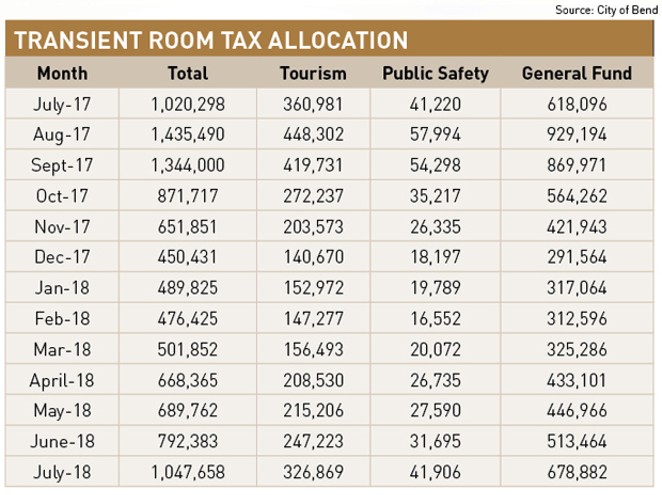
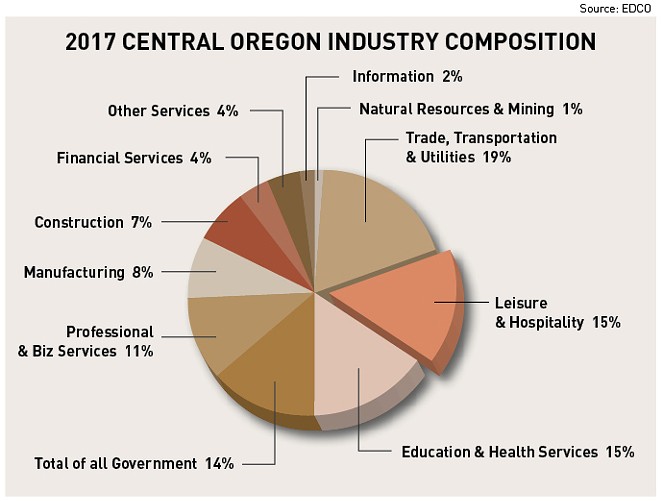
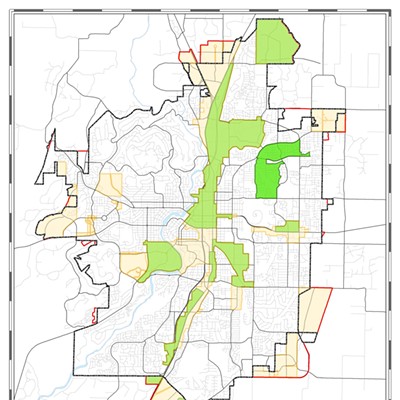

![Tourism in the Time of COVID: Kevney Dugan, CEO of Visit Bend 🎧 [with podcast]](https://media2.bendsource.com/bend/imager/tourism-in-the-time-of-covid-kevney-dugan-ceo-of-visit-bend-with-podcast/u/r-bigsquare/12908687/bend-don_t-break-promo-slider.jpg?cb=1680199454)
